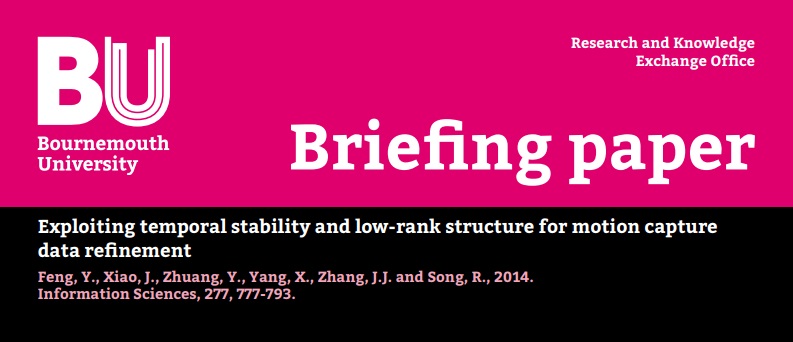 Our BU briefing papers are designed to make our research outputs accessible and easily digestible so that our research findings can quickly be applied – whether to society, culture, public policy, services, the environment or to improve quality of life. They have been created to highlight research findings and their potential impact within their field.
Our BU briefing papers are designed to make our research outputs accessible and easily digestible so that our research findings can quickly be applied – whether to society, culture, public policy, services, the environment or to improve quality of life. They have been created to highlight research findings and their potential impact within their field.
In recent years, motion capture data (mocap) have been widely used in computer games, film production and sport sciences. The great success of animated and animation enhanced feature films, such as Avatar, provide compelling evidence for the values of mocap techniques. However, even with the most expensive commercial mocap systems, there are still instances where noise and missing data are inevitable.
This paper examines the motion refinement problem and presents an effective framework to solve it, demonstrated by extensive experiments on both synthetic and real data. The experiment shows that the proposed method outperforms all competitors not only in predicting missing values but also in de-noising most of the time.
Click here to read the briefing paper.
 Pleased to announce that a copy of the Handbook of Arts-based Research, Patricia Leavy, Editor, is now available at
Pleased to announce that a copy of the Handbook of Arts-based Research, Patricia Leavy, Editor, is now available at  Pleased to announce a ground-breaking Chapter on the use of film in research from FMC’s Trevor Hearing and FHSS’ Kip Jones in Guilford Publications’ Handbook of Arts-Based Research edited by Patricia Leavy.
Pleased to announce a ground-breaking Chapter on the use of film in research from FMC’s Trevor Hearing and FHSS’ Kip Jones in Guilford Publications’ Handbook of Arts-Based Research edited by Patricia Leavy.











 Missing Persons Indicator Project Recruitment
Missing Persons Indicator Project Recruitment Celebrating our Research: Postgraduate Research Showcase 2026
Celebrating our Research: Postgraduate Research Showcase 2026 Nursing Research REF Impact in Nepal
Nursing Research REF Impact in Nepal Fourth INRC Symposium: From Clinical Applications to Neuro-Inspired Computation
Fourth INRC Symposium: From Clinical Applications to Neuro-Inspired Computation ESRC Festival of Social Science 2025 – Reflecting back and looking ahead to 2026
ESRC Festival of Social Science 2025 – Reflecting back and looking ahead to 2026 3C Event: Research Culture, Community & Cookies – Tuesday 13 January 10-11am
3C Event: Research Culture, Community & Cookies – Tuesday 13 January 10-11am ECR Funding Open Call: Research Culture & Community Grant – Application Deadline Friday 12 December
ECR Funding Open Call: Research Culture & Community Grant – Application Deadline Friday 12 December MSCA Postdoctoral Fellowships 2025 Call
MSCA Postdoctoral Fellowships 2025 Call ERC Advanced Grant 2025 Webinar
ERC Advanced Grant 2025 Webinar Horizon Europe Work Programme 2025 Published
Horizon Europe Work Programme 2025 Published Update on UKRO services
Update on UKRO services European research project exploring use of ‘virtual twins’ to better manage metabolic associated fatty liver disease
European research project exploring use of ‘virtual twins’ to better manage metabolic associated fatty liver disease